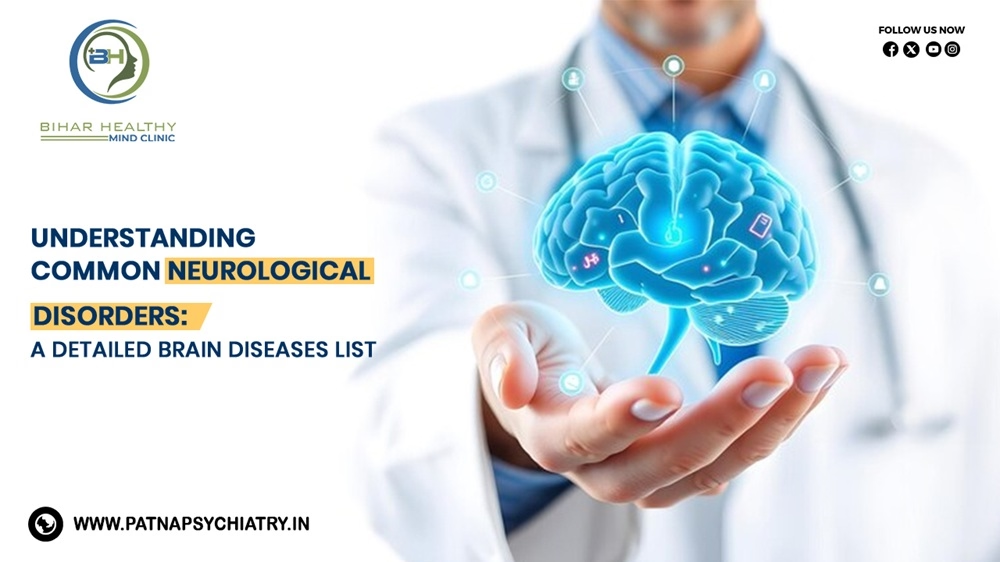
The human brain is an incredibly intricate organ, responsible for managing essential bodily functions as well as emotions and memory. However, like any other part of the body, it is also susceptible to various diseases and disorders. In this blog, we will walk through a comprehensive brain diseases list, highlighting key neurological and psychiatric conditions, their symptoms, possible causes, and available treatments.
At Patna Psychiatry, patients receive individualized, evidence-based care led by Dr. Saurabh Kumar, MD (Psychiatry), who is highly regarded as the Best Psychiatrist in Patna. This blog is intended to raise awareness and guide those seeking help for themselves or their loved ones.
What Are Brain Diseases?
Brain disorders encompass various conditions that disrupt the brain’s structure, operations, or chemical balance. These conditions can be neurological (involving nerves and brain function) or psychiatric (involving mental and emotional health). The symptoms associated with brain disorders can vary greatly, depending on the specific condition and its severity.
Below is a structured brain diseases list to provide a clearer understanding of some of the most common and serious brain-related conditions.
Brain Diseases List: Common Neurological and Psychiatric Conditions
Alzheimer’s Disease
A progressive form of dementia that causes memory loss, confusion, and changes in behavior. It primarily affects older adults and is linked to abnormal protein deposits in the brain.
-
Symptoms:
- Memory lapses
- Difficulty in communication
- Disorientation
-
Treatment:
- While there is no cure, medications and therapies can help slow progression and improve quality of life.
Parkinson’s Disease
A chronic neurological disorder affecting movement, coordination, and balance due to reduced dopamine production in the brain.
-
Symptoms:
- Tremors
- Muscle stiffness
- Slow movements
-
Treatment:
- Treatments such as Levodopa, along with physical rehabilitation, are often effective in managing the symptoms.
Stroke
This life-threatening condition arises when the brain’s blood supply is suddenly blocked, causing potential damage to brain cells.
-
Symptoms:
- Sudden numbness or weakness (especially on one side)
- Trouble speaking
- Loss of balance or coordination
-
Treatment:
- Immediate medical intervention is crucial. Rehabilitation often includes physical, occupational, and speech therapy.
Epilepsy
This disorder is characterized by repeated seizures resulting from irregular electrical signals within the brain.
-
Symptoms:
- Seizures
- Temporary confusion
- Loss of consciousness
-
Treatment:
- Managed through antiepileptic medications and, in some cases, surgical interventions.
Depression
Although often seen as a psychological condition, depression has neurochemical roots and affects brain function and structure.
-
Symptoms:
- Persistent sadness
- Loss of interest
- Sleep disturbances
-
Treatment:
- Psychotherapy, lifestyle modifications, and medications such as antidepressants.
Anxiety Disorders
A group of mental health conditions that cause excessive fear or worry, affecting daily life.
Schizophrenia
A severe psychiatric disorder involving distorted thinking, hallucinations, and impaired functioning.
Brain Tumors
Abnormal growths of cells in the brain that can be benign or malignant.
Multiple Sclerosis (MS)
An autoimmune disorder that damages the protective covering of nerves, disrupting communication between brain and body.
Bipolar Disorder
A mood disorder characterized by extreme mood swings, from manic highs to depressive lows.
Why Early Diagnosis Matters
Timely diagnosis of disorders found in the brain diseases list plays a critical role in ensuring effective management and recovery. Brain disorders, if left untreated, can lead to irreversible damage and severely impact a person’s quality of life.
Whether dealing with depression, schizophrenia, or epilepsy, seeking help from a trained specialist can make a significant difference. Dr. Saurabh Kumar’s holistic approach at Patna Psychiatry ensures every patient is treated with empathy, clinical precision, and confidentiality.
Choosing the Right Psychiatric Help
If you or a loved one is experiencing symptoms related to any of the listed conditions, prompt professional consultation is vital. Individuals in Bihar can consider reaching out to Dr. Saurabh Kumar, often considered the Best Psychiatrist in Patna, for expert evaluation and care.
At Patna Psychiatry, treatment is patient-centric, integrating medication, therapy, and ongoing support to achieve long-term wellness.
Conclusion
Understanding the various conditions in this brain diseases list helps break the stigma around mental and neurological health. Knowledge empowers individuals to recognize warning signs, seek appropriate care, and advocate for mental wellness.
If you’re in search of expert care and compassionate support, Patna Psychiatry is a trusted destination for comprehensive brain and mental health treatment.
Disclaimer: All characters and events depicted in this blog are entirely fictional. Any resemblance to actual persons, living or dead, is purely coincidental. The content is intended for informational purposes only and should not be considered as medical advice. Always consult a qualified healthcare professional for medical concerns.
-
-
Symptoms:
- Restlessness
- Rapid heartbeat
- Panic attacks
-
Treatment:
- Treatment often involves methods like Cognitive Behavioral Therapy (CBT), stress-reduction strategies, and selective serotonin reuptake inhibitors (SSRIs).
-
Symptoms:
- Delusions
- Hallucinations
- Disorganized behavior
-
Treatment:
- Long-term treatment with antipsychotic medications, therapy, and support systems.
-
Symptoms:
- Headaches
- Vision problems
- Cognitive impairments
-
Treatment:
- Surgical removal, chemotherapy, and radiation therapy depending on tumor type and location.
-
Symptoms:
- Fatigue
- Numbness or tingling
- Muscle weakness
-
Treatment:
- Immunosuppressive drugs, physical therapy, and symptom management.
-
Symptoms:
- Intense emotional states
- Impulsivity
- Depressive episodes
-
Treatment:
- Mood stabilizers, psychotherapy, and lifestyle regulation.
-
Visitors: 419





No comments yet.